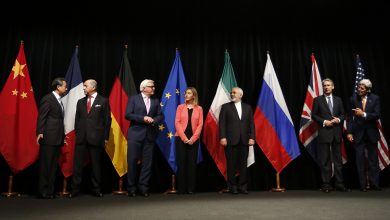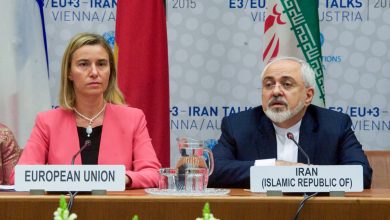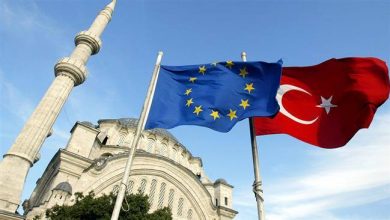As UAE and Bahrain Normalise Relations With Israel, Where Is the EU?

On September 15, the Prime Minister of Israel Binyamin Netanyahu travelled to Washington DC to sign a US-brokered peace agreement with the UAE and Bahrain. While the EU has praised the agreement as conducive to regional stability, only the Hungarian Prime Minister, a right-wing ally of Washington and Israel, joined them at the signing. The rest of the world is silent. In Israel itself, no one is celebrating and the agreements are said to be highly unpopular. Why, after so many years, a peace agreement that brings so little peace to the troubled soul of the region?
An Israel Peace Agreement to Prepare for War?
Since the founding of the state of Israel, there has always been peace between Israel and the countries of the Gulf. Moreover, while the Gulf States support the Palestinians financially, they are also virtual allies with Israel against their mutual enemy Iran. So why was diplomatic recognition not accorded earlier? It was a largely symbolic choice to show solidarity with the Palestinian cause. More importantly, the normalisation of relations was also used as a bargaining chip to gain some concessions from Israel.
With the UAE and Bahrain peace agreements with Israel, these concessions have taken a precise shape, one strongly influenced by Washington. In particular, these have taken the form of Israeli approval of US arms sales to the Gulf and withdrawal of plans to annex the West Bank. Palestinian solidarity, such as it is, was thrown by the wayside, though humanitarian aid from the Gulf continues.
The significance of Israeli approval of US arms sales – agreed to as a quid pro quo for recognition – comes principally from the role Israeli lobbying plays in US politics. Without Israel’s approval, its AIPAC lobby in the US routinely painted any attempt to sell weapons to the Gulf States as a betrayal of Israel, even though there was no chance of them ever being used against it. With Israeli’s approval, the most modern weaponry can be sold at the highest prices, siphoning off hefty surcharges in form of bribes for all concerned.
By better arming the Gulf States, further preparation for the eventual Sunni-Israeli war with Shia Iran goes forward. The Sunnis would like to destroy the Shias once and for all, and Israel’s ambitions to expand its territory into a Greater Israel would find a smoother path without Iran acting as a major roadblock.
As for annexation of the West Bank, the increasingly expansionist Israeli population appears very disappointed that it will not take place. Its importance, however, is somewhat dubious. Just like as peace between Israel and the Gulf States was a reality even without any accord, the annexation of the West Bank has been the de facto state of being for a long time. Israel rules over every sneeze and twitch in the region. It is not clear that formal annexation would have helped Israel in any way. It is indeed quite possible that formal annexation would have focused international attention on the situation, leading to further sanctions and isolation for Israel. It just might have been a catalyst for some improvement, even if hardly ideal in and of itself.
As it is, the peace agreement does not change the situation in the West Bank and rather prepares the countries of the region for more war while assuring that the corruption by the elites continues apace. No wonder no one is celebrating peace.

Where is the EU?
The European Union currently has an association agreement with Israel which facilitates economic relations and also provides aid to the Palestinians. Relations were somewhat troubled by the 2015 EU decision to label Israeli products from the West Bank according to their origin in the settlements. This measure went to the heart of the international debate of Israel as a state, with Israelis fearing that the Boycott, Divestment and Sanctions movement over the Palestinian situation would harm their interests substantially if allowed to take root.
The Israeli government did everything within its power to prevent this grassroots pro-Palestinian movement from gaining traction, including lobbying to make it illegal in many Western jurisdictions and systematically attacking its proponents, not to exclude disinformation campaigns without official attribution. After the EU nevertheless approved the labelling, Netanyahu decided to suspend, pending review, the EU’s role in the peace process.
The two most recent High Representatives of the EU for Foreign Affairs and Security Policy, Federica Mogherini and Joseph Borrell, have generally been perceived to be pro-Palestinian. Within the Union itself, Franco-German leadership which pushes for a two-state solution that would recognise a Palestinian state has been somewhat compromised by positions taken by the Visegrad countries of Eastern Europe, more favourable to Israel. Anti-Muslim sentiment by the currently dominant political right in Eastern Europe, along with ideological considerations, have made them more favourable to the status quo and Israeli interests.
This internal conflict came to a head when the US moved its embassy to Jerusalem. Several Visegrad countries, along with Romania, prevented an EU resolution condemning the move. The countries were also persuaded to abstain on a UN resolution condemning the US move rather than voting with the position of the Union, under threats from US Ambassador to the UN Nicki Haley and intense lobbying from Israel.
The situation has not been without domestic repercussions inside the EU. The still large French-Jewish community has been troubled by Muslim-Jewish relationships and even more by third-party propaganda to the point of considering additional emigration to Israel. The refugee situation resulting from the Syrian conflict has also caused an upheaval in domestic politics and has been used by third parties to destabilize the Union.
All Roads Lead from Jedda To Teheran
The occupation of Palestine – while an international catastrophe that has been the leitmotif of international politics of the past 70 years – is yet but a minor scene in a larger conflict on the stage that of Shia Iran and Sunni Saudi Arabia. This age-old religious conflict, now with additional geopolitical reasons, informs all of the wars in the region, either directly through active participation or indirectly through proxies, arms and diplomacy.
The Syrian conflict pits Shia Syria with aid from Iran and Russia, which has an important naval base and troops there, against Sunni insurgents including ISIS, aided by Saudi Arabia and Israel. France and the Netherlands, along with the United States and the UK, have aided the Syrian rebels while maintaining their opposition to ISIS, though other EU countries – notably Germany – have objected. The Kurds constitute a third force, opposing ISIS, but opposed by Turkey and in a somewhat ambivalent relationship with Assad’s Syrian government.
As the bet by the West to oust Assad has failed miserably, contributing to a refugee crisis in Western Europe, the conflict has to some extent reverted to its Shia-Sunni origins with the wild card of Kurdish independence and now Turkey thrown into the mix.
Though condemning the recent agreements recognizing Israel, Turkey’s role in the conflicts straddles both sides. Becoming the first Muslim country to recognize Israel in 1949, Turkey has also been (together with Iran) one of the few reliable supporters of the Palestinians in the region. Relations with Israel, on the other hand, have ebbed and flowed. Turkey 80% Sunni majority has frequently supported Iran in regional conflicts, notably showing support for the country during its nuclear negotiations with the West.
It has had a more contentious relationship to Saudi Arabia, perhaps culminating in the killing of a Saudi journalist by the Saudis in their Consulate in Istanbul. Turkey is a member of NATO, but in its own region has shown considerable independence and is currently in a very contentious relationship with other NATO members in the Eastern Mediterranean where natural gas interests are at stake.
A Final Thought
These agreements bare the hallmark of the corrupt self-dealing that has subsumed politics in the Middle East. By upholding the values of peace, respect for human rights and democracy, the EU can play a major role in shining a light of hope during this period of darkness.





